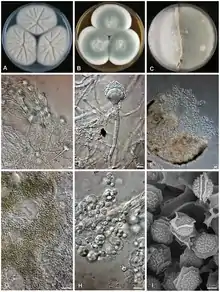| Aspergillus felis | |
|---|---|
 | |
| Colonies growing 7 days at 25°C on CYA (A) and MEA (B); Crossing of CBS 130245 and 130246 at 30°C (C); Conidiophores and conidia (D, E and G); Cleistothecium (F); Ascospores (H-I). | |
| Scientific classification | |
| Domain: | Eukaryota |
| Kingdom: | Fungi |
| Division: | Ascomycota |
| Class: | Eurotiomycetes |
| Order: | Eurotiales |
| Family: | Aspergillaceae |
| Genus: | Aspergillus |
| Species: | A. felis |
| Binomial name | |
| Aspergillus felis Barrs, van Doorn, Varga & Samson, 2013[1] | |
| Type strain | |
| 131F4, DTO 155G2, IFM 600, JV-2013, CBS 130245, CBS H-21125[1] | |
Aspergillus acidus is a heterothallic species of fungus in the genus Aspergillus which can cause aspergillosis in humans, dogs and cats.[1][2][3][4]
References
- 1 2 3 "Aspergillus felis". www.uniprot.org.
- ↑ www.mycobank.org
- ↑ Barrs, Vanessa R.; van Doorn, Tineke M.; Houbraken, Jos; Kidd, Sarah E.; Martin, Patricia; Pinheiro, Maria Dolores; Richardson, Malcolm; Varga, Janos; Samson, Robert A.; Goldman, Gustavo Henrique (14 June 2013). "Aspergillus felis sp. nov., an Emerging Agent of Invasive Aspergillosis in Humans, Cats, and Dogs". PLOS ONE. 8 (6): e64871. Bibcode:2013PLoSO...864871B. doi:10.1371/journal.pone.0064871. PMC 3683053. PMID 23798996.
- ↑ "A new fungal species causing invasive aspergillosis in cats and humans | Australian Veterinary Association". www.ava.com.au. Archived from the original on 2017-02-02. Retrieved 2017-01-29.
Further reading
- "Aspergillus felis: new fungus found in Australia, causes infections in humans, cats | Aspergillus & Aspergillosis Website". www.aspergillus.org.uk.
- Lynelle R, Johnson (2014). Canine and Feline Respiratory Medicine, An Issue of Veterinary Clinics: Small Animal Practice. Elsevier Health Sciences. ISBN 978-0-323-26421-1.
- Michael, Schaer; Frederic P., Gaschen (2016). Clinical Medicine of the Dog and Cat, Third Edition. CRC Press. ISBN 978-1-482-22606-5.
- Richard G., Harvey; Gert ter, Haar (2016). Ear, Nose and Throat Diseases of the Dog and Cat. CRC Press. ISBN 978-1-315-35575-7.
This article is issued from Wikipedia. The text is licensed under Creative Commons - Attribution - Sharealike. Additional terms may apply for the media files.